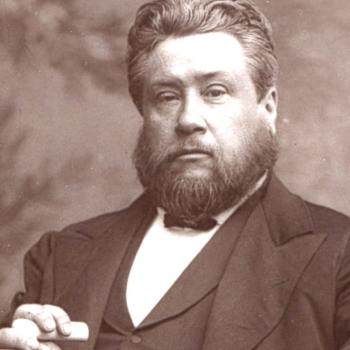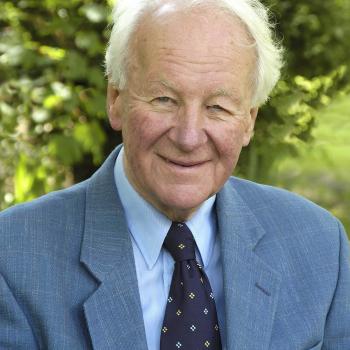 The word revival is back on the lips of people I know — I hadn’t even heard it mentioned for a very long time until just recently.
The word revival is back on the lips of people I know — I hadn’t even heard it mentioned for a very long time until just recently.
I thought I would share some quotes from Spurgeon on the subject of revival with you today. I hope and pray it inspires you to pray for revival, and to have an eye that is trained to see the signs of God’s reviving work that are all around us every day.
“And now, at this time, we want to have the old truths restored to their places. The subtleties and the refinements of the preacher must be laid aside. We must give up the grand distinctions of the school-men, and all the lettered technicalities of men who have studied theology as a system, but have not felt the power of it in their hearts; and when the good old truth is once more preached by men whose lips are touched as with a live coal from off the altar, this shall be the instrument, in the hand of the Spirit, for bringing about a great and thorough revival of religion in the land.” (From Pyromaniacs)
“We need a work of the Holy Spirit of a supernatural kind, putting power into the preaching of the Word, inspiring all believers with heavenly energy, and solemnly affecting the hearts of the careless, so that they turn to God and live. We would not be drunk with the wine of carnal excitement, but we would be filled with the Spirit. We would behold the fire descending from heaven in answer to the effectual fervent prayers of righteous men. Can we not entreat the Lord our God to make bare His holy arm in the eyes of all the people in this day of declension and vanity?” (The Kind of Revival We Need)
“What is taught to us by a revival? I think it is just this—that God is absolute monarch of the hearts of men. God does not say here if men are willing; but he gives an absolute promise of a blessing. As much as to say, “I have the key of men’s hearts; I can induce the ploughman to overtake the reaper; I am master of the soil — however hard and rocky it may be, I can break it and I can make it fruitful.” When God promises to bless his Church and to save sinners, he does not add, “If the sinners be willing to be saved.” No, great God! Thou leadest free will in sweet captivity, and thy free grace is all triumphant. Man has a free will, and God does not violate it; but the free will is sweetly bound with fetters of the divine love till it becomes more free than it ever was before. The Lord, when he means to save sinners, does not stop to ask them whether they mean to be saved, but like a rushing mighty wind the divine influence sweeps away every obstacle; the unwilling heart bends before the potent gale of grace, and sinners that would not yield are made to yield by God.” (A Revival Sermon based on Amos 9:13)
“Ye may pray, and pray, and pray, but there shall be no conversions, no sense of quickening, until the Spirit’s working be distinctly recognized. The minister shall be just as much a preacher of the mere letter as ever he was; the Church officers shall be as formal and official as ever they were; the Church members shall be as inconsistent and as indifferent as they were wont to be; the congregation shall be as uninterested and as unmoved as they were in the worst times, except the Spirit of God work with us.
In this thing we may quote the words of the psalmist, ‘Except the Lord build the house, they labor in vain that build it: except the Lord keep the city, the watchman waketh but in vain. It is vain for you to rise up early, to sit up late, to eat the bread of sorrows: for so he giveth his beloved sleep.’ O friends, it is well to have a holy industry and a devout perseverance; it is well to strain every nerve, and put forth every effort; but all this must end in the most sorry, heart-sickening failure, unless the Lord rend the heavens and come down.
I am telling you what you all do know, and what I trust you feel, but it is what we are constantly forgetting; for many are they that go and warfare at their own charges, and so become both bankrupt and defeated; and many be they who would build God’s house simply by stress of human effort, but they fail, because God is not there to give them success . . . .
God thinks souls to be very precious, and his own words are, ‘As I live, saith the Lord, I have no pleasure in the death of him that dieth, but had rather that he should turn unto me and live.’ Are we agreed with God in that? Our God thinks souls to be so precious, that if a man could gain the whole world and lose his soul, he would be a loser. Are we agreed with him there? In the person of Christ, our God wept over Jerusalem; watered with tears that city which must be given up to the flames. Have we tears, too? Have we compassion, too? When God thinks of sinners it is in this wise: ‘How shall I give thee up, Ephraim? How shall I deliver thee, Israel? How shall I make thee as Admah? How shall I set thee as Zeboim?’ Can we bemoan sinners in that way? Do we stir our souls to an agony of grief because men will turn from God and will willfully perish in their sin? If, on the contrary, you and I selfishly say, “We are safe, it does not matter to us whether others are brought to know Christ,” we are not agreed, God will not work with us; and such of you as feel this indifferentism, this cursed lethargy, are our bane, our burden, our hindrance. God forgive you, and stir you up to feel that your heart will not rest unless poor sinners are plucked as brands from the burning. Are we agreed here?
If we would have the Lord with us, in the next place, we must be agreed as to the means to be used in revival. We are agreed that the first means is the preaching of Christ. We do not want any other doctrine than that we have received — Christ lifted up upon his cross, as the serpent was lifted up upon the pole. This is the remedy which we, in this house of prayer, believe in. Let others choose sweet music, or pictures, or vestments, or baptismal water, or confirmation, or human rites; we abhor them, and pour contempt upon them; as for us, our only hope lies in the doctrine of a substitute for sinners, the great fact of the atonement, the glorious truth that Christ Jesus came into the world to seek and to save sinners.
I think we are agreed with God in this, that the preaching of Christ is the way by which believers shall be saved. God’s great agency is the Holy Spirit. We are agreed, brethren, that we do not want sinners to be converted by our persuasion, we do not want them brought into the Church by excitement; we want the Spirit’s work, and the Spirit’s work alone. I would not bend my knee once in prayer, much less day by day, to win a mere excitement; we have done without it, and we shall do without it by the grace of God; but I would give mine eyes, if I might but know that the Holy Spirit himself would come forth and show what divinity can do in turning hearts of stone to flesh.
In this thing, I think, that we are agreed with God. But God’s way of blessing the Church is by the instrumentality of all her members. The multitude must be fed, but it must not be by Christ’s hand alone: he gave the bread to the disciples, and the disciples, to the multitude . . .
Yet again, dear friends, are we agreed this day as to our utter helplessness in this work?
. . . An humble Church will be a blessed Church; a Chu
rch that is willing to confess its own errors and failures, and to lie at the foot of Christ’s cross, is in a position to be favored of the Lord. I hope we are agreed, then, with God, as to our utter unworthiness and helplessness, so that we look to him alone. I charge you all to be agreed with God in this thing, that if any good shall be done, any conversions shall occur, all the glory must be given to him . . . .
Before Israel could take possession of the promised rest of Canaan, Joshua had to see to it that they were purified by the rite of circumcision. Whenever God would visit his people, he always demands of them some preparatory purging that they may be fit to behold his presence; for two cannot walk together, unless that which would make them disagree be purged out.
A few suggestions then, as to whether there is anything in us with which God cannot agree. Here I cannot preach to you indiscriminately, but put the task into the hand of each man to preach to himself. In the days of the great weeping, we read that every man wept apart and his wife apart, the son apart, and the daughter apart, all the families apart. So it must be here. Is there pride in me? Am I puffed up with my talent, my substance, my character, my success? Lord purge this out of me, or else thou canst not walk with me, for none shall ever say that God and the proud soul are friends: he giveth grace to the humble; as for the proud, he knoweth them afar off, and will not let them come near to him. Am I slothful? Do I waste hours which I might usefully employ? Have I the levity of the butterfly, which flits from flower to flower, but drinks no honey from any of them? Or have I the industry of the bee, which, wherever it lights, would find some sweet store for the hive? Lord, thou knowest my soul, thou understandest me. Am I doing little where I might do much? Hast thou had but little reaping for much sowing? Have I hid my talent in a napkin? Have I spent that talent for myself, instead of spending it for thee? Slothful souls cannot walk with God. “My Father worketh,” saith Jesus, “and I work”; and you who stand in the market-place idle, may stand there with the devil, but you cannot stand there with God. Let every brother who is guilty of this, purge away his sloth.
Or am I guilty of worldliness. This is the crying sin of many in the Christian Church. Do I put myself into association with men who cannot by any possibility profit me? Am I seen where my Master would not go? Do I love amusements which cannot afford me comfort when I reflect upon them; and which I would never indulge in if I thought that Christ would come while I was at them? Am I worldly in spirit as to fashion? Am I as showy, as volatile, as frivolous as men and women of the world? If so, if I love the world, the love of the Father is not in me; consequently he cannot walk with me, for we are not agreed.
Again, am I covetous? Do I scrape and grind? Is my first thought not how I can honor God, but how I can accumulate wealth? When I gain wealth, do I forget to make use of it as a steward? If so, then God is not agreed with me; I am a thief with his substance; I have set myself up for a master instead of being a servant, and God will not walk with me till I begin to feel that this is not my own, but his; and that I must use it in his fear.
Again, am I of an angry spirit? Am I harsh towards my brethren? Do I cherish envy towards those who are better than myself, or contempt towards those who are worse off? If so, God cannot walk with me, for he hates envy, and all contempt of the poor is abhorrent to him.
Is there any lust in me? Do I indulge the flesh? Am I fond of carnal indulgences by which my soul suffers? If so, God will not walk with me; for chambering, and wantonness, and gluttony, and drunkenness separate between a believer and his God: these things are not convenient to a Christian . . . .
For my own part, I cry unto my Master, that if there be anything that can make me more fit to be the messenger of God to you and to the sons of men, however painful might be the preparatory process, he would graciously be pleased not to spare me of it. If by sickness, if by serious calamities, if by slander and rebuke, more honor can be brought to him, then hail! and welcome! all these things; they shall be my joy; and to receive them shall be delight. I pray you, utter the same desire: “Lord, make me fit to be the means of glorifying thee.” (A Preparation for Revival)











